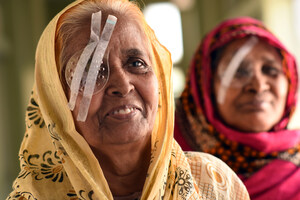PROGRAM WILL TEACH AND TRAIN CHINESE EYE CARE PROFESSIONALS FOR TWO WEEKS IN GANSU PROVINCE
NEW YORK, May 21, 2012 /PRNewswire-USNewswire/ -- ORBIS's Flying Eye Hospital (FEH) – the world's only ophthalmic surgical and training hospital with wings – touched down today in Lanzhou, China to conduct a program focused on building the skills of local eye care professionals to address the leading causes of blindness in the region. The program is part of ORBIS's continuous commitment to support ongoing in-country programs in China aimed at promoting skills, improving eye health awareness and delivering quality patient care.
(Logo: http://photos.prnewswire.com/prnh/20100614/DC20562LOGO)
This will be the 37th FEH program in China and the second time the plane visits Lanzhou. ORBIS has supported programs in Gansu for nearly ten years and its current active in-country project, "Children's Vision in Gansu: Establishing a Comprehensive Childhood Vision Network," aims to increase availability, accessibility and sustainability of pediatric services. Currently there are only 15 pediatric ophthalmologists in the province serving a child population of over 5.5 million. The need to expand and improve care is one of the many reasons that ORBIS continues to work closely with local partners to help improve the delivery of quality pediatric eye care services. In addition, ORBIS is working to strengthen the referral network at 13 county hospitals and the pediatric services at Gansu Rehabilitation Center Hospital (GRCH).
"ORBIS and the FEH are honored to be in Lanzhou, making this our 37th program in China," said David M. Johnson, Director, ORBIS Flying Eye Hospital. "This program in Lanzhou provides ORBIS and our partners a great opportunity to continue to build the capacity and infrastructure of eye care in the region, specifically in the area of pediatric ophthalmology."
Through a partnership with the Second Hospital of Lanzhou University, the largest teaching hospital and eye center in the province, the FEH will conduct training programs in ophthalmology, nursing, biomedical technology and anesthesia. Recognized for its high standard of patient care, the Second Hospital in Lanzhou is responsible for organizing provincial referral and outreach initiatives for vision care and has made major investments in building and developing its ophthalmology department making it an ideal partner for ORBIS programs. Local government support along with a strong relationship with the Disabled People's Federation, has allowed current ORBIS partners to benefit from FEH programs and strengthen the network and patient referrals.
During the two week program in Lanzhou, the FEH, county level doctors and rural outreach workers will have the opportunity to work side-by-side with leading international specialists and experts from Lanzhou Second Hospital. In addition, trainees from Gansu Rehabilitation Center and Lanzhou Second Hospital will participate in skills exchange programs and seminars aimed at strengthening their skills and improving the quality of available eye care services. The primary subspecialties of the program in Lanzhou are pediatric ophthalmology and the management and treatment of childhood blindness. The key concerns of rural and county level doctors will also be addressed and include glaucoma, cornea and external disease, and medical retina.
The FEH team will work to help reinforce and improve consistent and comprehensive referral patterns while strengthening local skills-exchange networks to address leading and emerging causes of blindness in the province.
In 1999 ORBIS International opened its first country office in China signaling our commitment to working with the Ministry of Health and local partners in building capacity and improving sight saving throughout the country. Since that time ORBIS and our local partners have accomplished the following:
- Over 30 million individuals receiving eye education and a significant percentage screened
- Over 3 million children and adults receiving surgery and other treatment
- Over 20,000 doctors receiving in depth training by ORBIS volunteer faculty and partners in every sub-specialty in over 30 provinces
- Over 25,000 nurses, biomedical engineers, anesthesiologists, and health care workers trained.
- 36 FEH missions throughout China supported by our global volunteer faculty. These missions are seen as the strongest platform for increasing advocacy and clinical excellence. The first FEH was donated to the National Aviation Museum and was recognized specifically by President Jiang Zemin.
- Over 100 Hospital Based Programs conducted by world renowned volunteer faculty
Blindness in China
China accounts for 18 percent of the world's blind and of the 1 million children suffering from blindness in Asia, approximately 400,000 live in China. The needs of eye care communities and the challenges they face vary across provinces, but at the national level, the major causes of blindness reflect global trends and include: cataract, corneal disease and glaucoma. China has the highest rate of myopia among children in the world and some of the 90 percent of poor vision among China's children is due to uncorrected refractive error. Only about 50 percent of the estimated 22,000 eye doctors in China can perform cataract surgery and most surgically active ophthalmologists are disproportionately located and practicing in urban areas.
Despite recent industrial growth and economic expansion in its capital city, Lanzhou, Gansu is still considered one of China's most impoverished provinces and the cost of ophthalmic services can also be prohibitive. The infrastructure and capacity of health facilities in the region is generally poor, which has had an impact on available eye care services with only a few hospitals offering cataract and simple extraocular surgeries at the county level. Although most hospitals can provide basic outpatient treatment of common eye conditions, the quality varies. At both provincial and national levels, resources, effective utilization and availability of services in the field of eye care are in need of improvement.
Facts on the Prevention of Blindness Worldwide:
On a global scale, 285 million people are visually impaired. 80 percent of all visual impairment can be avoided or cured. Approximately 90 percent of all visually impaired people live in developing countries. The areas of significant global prevention progress include:
- Further development of eye health care services, which has led to increased availability and affordability;
- Increased commitment to prevention and cure from national leaders, medical professionals and private and corporate partners;
- Higher awareness and use of eye health care services by patients and the general population; and
- Implementation of effective eye health strategies to eliminate infectious causes of vision loss.
About ORBIS International
ORBIS International is a nonprofit, humanitarian organization dedicated to saving sight worldwide. ORBIS prevents and treats blindness through hands-on training, public health education, improved access to quality eye care, and partnerships with local health care organizations in an effort to eliminate avoidable blindness. By building their long-term capabilities, ORBIS helps its partner institutions take action to reach a state where they can provide, on their own, quality eye care services that are affordable, accessible, and sustainable. To learn more about ORBIS, please visit www.ORBIS.org.
SOURCE ORBIS International
WANT YOUR COMPANY'S NEWS FEATURED ON PRNEWSWIRE.COM?
Newsrooms &
Influencers
Digital Media
Outlets
Journalists
Opted In






Share this article